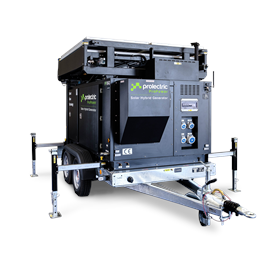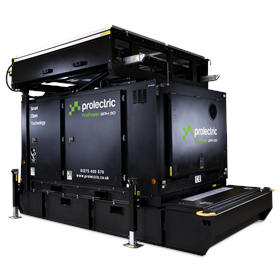News & Insights
Powering the Future: Solar Hybrid Generators vs Diesel-Powered Generators
Wednesday, 17 May 2023 Munir Gailani
Many businesses within the construction sector are now looking to reduce their carbon impact; however, they are still heavily reliant on fossil-fuelled non-road mobile machinery (NRMM), including temporary power generators. Rising fuel and material costs, coupled with the withdrawal of Red Diesel last year, have forced many to seek alternative, more costly fuel sources. This has hit the heavy construction equipment sector the hardest, with red diesel no longer permitted for power generation. Furthermore, the switch from red to white diesel in generators incurs an additional expense of 46.81 pence per litre used — five times as much duty as before. Unsurprisingly, this is detrimental to costs and cash flow for many businesses.
Consequently, more and more construction businesses are looking for reliable, off-grid power generators to help save on diesel costs. Naturally, this has promoted the debate between solar-hybrid and diesel-powered generators. Both options offer advantages and disadvantages, and understanding the key differences can help determine which type of generator best suits their needs.
In this article, we'll compare and contrast solar hybrid-powered and diesel-powered generators, exploring their benefits, drawbacks, and environmental impacts.
Solar Hybrid Generators
Solar hybrid generators harness energy from the sun through photovoltaic panels, converting sunlight into electricity. This free, renewable energy is stored in batteries and is used for power before an HVO or diesel fuel generator is switched on.
Here are the key points to consider:
- Renewable and Clean Energy: Solar-hybrid generators rely on an abundant renewable energy source - the sun. Solar is one of the cleanest, most cost-effective forms of energy available, and when combined with battery storage, it can make significant CO2 and fuel cost savings. For example, Balfour Beatty plc deployed the industry's first JCB electric mini excavator, which needed to be charged daily whilst used as part of the A63 Improvement scheme. They used Prolectric's s ProPower solar hybrid generator to provide 210kWh of solar power, and we're able to run diesel fuel free for 936 hours, 78% of the project duration - read the case study here.
- Hybrid Battery Storage: As well as using free renewable energy, many cost and carbon savings are achieved as the generator is coupled with a battery. This allows the battery to run low power loads, thus preventing the need to power up the generator, wasting fuel and polluting harmful emissions. In hybrid systems, when the generator comes on, it either powers high loads or charges the battery at a fuel-efficient point. This is typically around 75% of the generator's maximum load.
- Cost-effective: There is no denying that the up-front costs to purchase a solar hybrid generator are greater than diesel generators. However, they can provide long-term cost savings on fuel, maintenance and operational costs. In addition, solar hybrid generators require less refuelling, and their reduced run-time versus diesel generators helps to reduce maintenance and servicing costs.
- Quiet: When using solar power, solar hybrid generators are quiet, making them ideal for noise-sensitive areas, including considerate construction sites.
- Versatile and Scalable: Solar hybrid generators can be used for various applications, including powering machinery, cabins and electric vehicles. They can also provide power in remote areas or during emergencies. The power capacity can also be easily expanded by connecting to most diesel generators up to 100kVA for the ultimate flexibility in fleet management.
Diesel generators
Diesel-powered generators rely on diesel fuel to generate power. They have been widely used for decades and offer their own set of advantages and disadvantages. Here are the key points to consider:
- Inefficient and Wasteful: Diesel generators are often oversized for their needs and are chosen for the application's peak load. However, the peak load is rarely needed, so they often waste fuel when the loads are low.
- Emissions and Pollution: The main drawback of diesel-powered generators is their environmental impact. They produce emissions, including nitrogen oxides (NOx), particulate matter (PM), and sulphur dioxide (SO2), which contribute to air pollution and have harmful effects on human health and the environment. Additionally, diesel fuel is non-renewable, and its extraction, production, and transport have negative environmental consequences.
- Reliable and Powerful: Diesel-powered generators are known for their reliability and high-power output. In addition, they can provide electricity for extended periods and handle heavy loads, making them suitable for large-scale operations or critical power needs.
- Widely Available: Diesel fuel is readily available in most parts of the world, making diesel-powered generators a practical option for high-power applications in areas with limited access to other energy sources. They can be refuelled, providing an uninterrupted power supply, and are easily serviced as there are many skilled mechanics.
At Prolectric, we offer innovative power solutions, including the ProPower single-phase solar hybrid generator and the ProPower 3-phase system. These cutting-edge solutions are helping businesses to move away from polluting fossil fuels and embrace the sustainable power revolution. Our solar hybrid technology combines solar and battery storage benefits with a backup generator's reliability.
The ProPower single-phase generator is ideal for power applications up to 20kVA. The ProPower hybrid generator has a 3040W solar array, 32kWh Lithium-Ion battery storage, a 15kVA inverter, and a single-phase stage V diesel generator for backup power, so it's a complete solution for smaller sites. Using this technology, the ProPower can cut fuel usage by up to 90% to reduce carbon emissions and save on fuel costs.
The ProPower Three-phase packs the latest solar and battery storage technology into a compact, trailer-mounted mobile unit designed to deliver clean, quiet, sustainable temporary power wherever you need it. The solar array and inverter produce twice the output power and three times the battery storage of our single-phase system, 90kWh of storage, making it best suited to high-power applications above 20kVA and up to 30kVA.
The three-phase also enables work sites to scale up their sustainable power delivery depending on their power requirements. It can connect up to most existing diesel generators, up to 100kVA, to give more flexibility in fleet management. It also offers greater compatibility, as most work sites in the UK are wired up with three-phase distribution boards.
If you're considering a solar-powered generator as a sustainable and cost-effective power solution, Prolectric's ProPower single-phase and ProPower 3-phase may be the ideal solution to take a step towards clean and sustainable energy.
Contact Prolectric on 01275400571 for more information on purchasing or ProRehire on 01275 400 006 for rehire inquiries.
Related news & insights
You may also be interested in
-
Wednesday 17 May 2023

Comparing Solar Hybrid and Diesel Generators for Future Power Solutions
Many businesses within the construction sector are now looking to reduce their carbon impact; however, they are still heavily reliant on...



